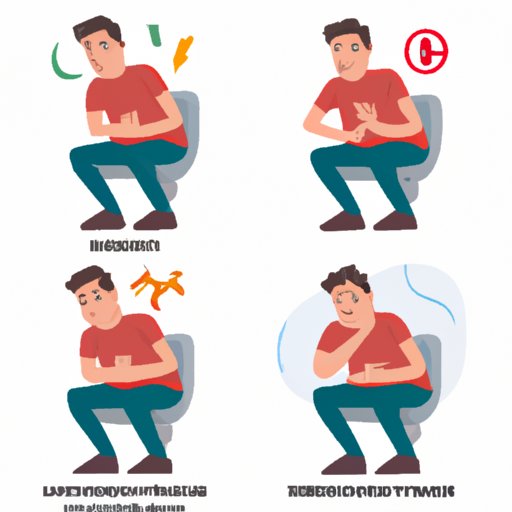
Introduction
Hemorrhoids are a common ailment that affects many people around the world. They are painful and uncomfortable, and can significantly impact the quality of life of those who suffer from them. Hemorrhoids are caused by swollen veins in the rectal and anal region, and can be triggered by a variety of factors. In this article, we will explore the different causes of hemorrhoids and provide effective prevention techniques to help you avoid them.
What are Hemorrhoids and Why do They Occur?
Hemorrhoids, also known as piles, are swollen veins in the rectal and anal region. There are two types of hemorrhoids: internal and external. Internal hemorrhoids are located inside the rectum and are not visible, while external hemorrhoids are located under the skin around the anus and can be seen and felt.
The most common symptoms associated with hemorrhoids include pain, itching, discomfort, and bleeding. In some cases, hemorrhoids can also cause bowel movement issues.
The primary causes of hemorrhoids include constipation, straining during bowel movements, and increased pressure on the veins around the rectum and anus. Hemorrhoids can also be caused by pregnancy, obesity, and aging.
The Causes of Hemorrhoids and How to Avoid Them
To avoid hemorrhoids, it’s important to understand the causes that contribute to their development. The primary cause of hemorrhoids is constipation, which can be caused by a variety of factors, including a lack of fiber in the diet, dehydration, and sedentary lifestyle choices. To avoid constipation and reduce the risk of developing hemorrhoids, it’s essential to:
- Incorporate high-fiber foods into your diet, such as fruits, vegetables, and whole grains.
- Drink plenty of water and fluids throughout the day to avoid dehydration.
- Maintain a healthy body weight to reduce pressure on the veins around the rectal and anal region.
Anything Can Trigger Hemorrhoids. Everything You Need to Know
In addition to constipation, there are many other triggers of hemorrhoids. These triggers can include:
- Chronic diarrhoea
- Sitting for prolonged periods
- Heavy lifting or straining
- Pregnancy and childbirth
- Anal intercourse
- Low-fiber diet
Avoiding these triggers as much as possible can help reduce the risk of developing hemorrhoids. For example, if you sit for prolonged periods, try to take frequent breaks to stand up and stretch. If you need to lift something heavy, do so with your legs instead of your back to reduce pressure on the veins in the anal region.
Preventing Hemorrhoids: Healthy Habits to Incorporate into Your Daily Routine
To prevent hemorrhoids from developing, it’s essential to adopt healthy daily habits. Some of the most effective habits you can incorporate into your daily routine include:
- Increasing your physical activity level by exercising regularly
- Avoiding straining during bowel movements
- Taking regular breaks if you sit for prolonged periods
- Maintain healthy sleeping patterns to allow your body to adequately rest and repair itself
- Cultivating good hygiene habits to avoid triggering or infecting hemorrhoids.
By incorporating these healthy habits into your daily routine, you can reduce your risk of developing hemorrhoids and other related health issues.
Sitting Causing You Trouble? Understanding Hemorrhoids
Prolonged sitting contributes to the development of hemorrhoids, particularly in those who lead a sedentary lifestyle. Sitting for long hours puts pressure on the veins around the rectal and anal region, which can lead to the development of hemorrhoids.
However, simple techniques such as taking frequent breaks to stand up and stretch can be effective in preventing the development of hemorrhoids. Other relief techniques include taking warm baths, applying ice packs to the affected area, and using over-the-counter creams to reduce inflammation and discomfort.
Factors that Contribute to the Development of Hemorrhoids and How to Prevent Them
There are many factors that contribute to the development of hemorrhoids, including:
- Pregnancy and childbirth
- Obesity and being overweight
- Aging
- Prolonged periods of constipation
To prevent the development of hemorrhoids, it’s important to address these factors through lifestyle changes such as regular exercise, a healthy diet, and proper hygiene habits. In some cases, medical interventions may be necessary, such as surgery or medications. Consulting with a healthcare professional is recommended if you are experiencing severe hemorrhoid symptoms.
Are You at Risk of Developing Hemorrhoids? Here’s What You Need to Know.
There are several risk factors associated with the development of hemorrhoids, including:
- Age
- Obesity or being overweight
- Pregnancy and childbirth
- A sedentary lifestyle
- A lack of fiber in the diet
If you are at risk of developing hemorrhoids, it’s important to take preventative measures to reduce your chances of developing them. Prevention techniques such as healthy lifestyle habits and medical treatments are effective in reducing the risk of developing hemorrhoids. Consulting with a healthcare professional is recommended if you are experiencing severe hemorrhoid symptoms.
Conclusion
In conclusion, understanding the causes, triggers, and prevention techniques associated with hemorrhoids is essential in reducing the risk of developing them. By incorporating healthy lifestyle habits such as exercise, hydration, and healthy food choices, you can reduce your risk of developing hemorrhoids and other related health issues. Remember to consult with a healthcare professional if you are experiencing severe hemorrhoid symptoms.




